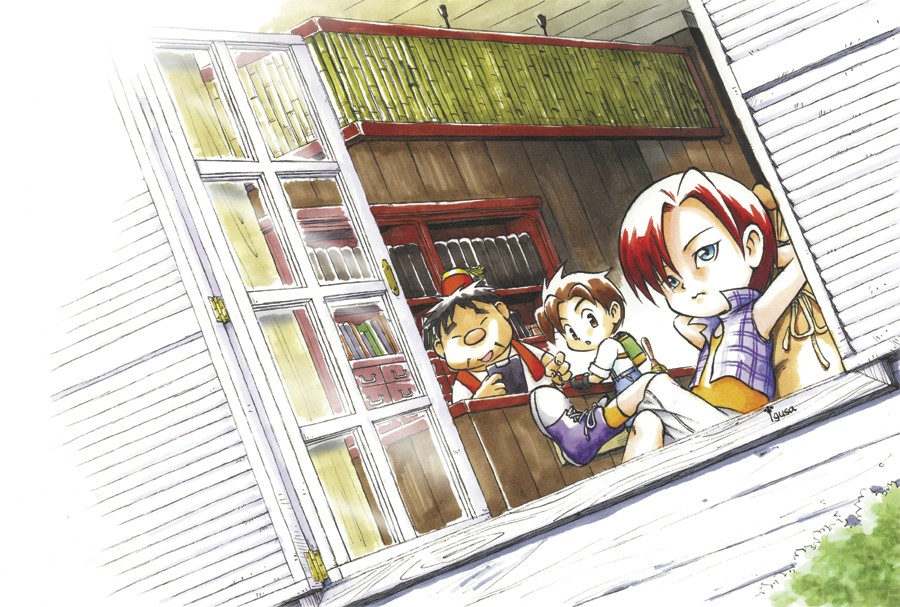Vast fields drift with the wind, the waves of grain dance across the horizon. Further in the distance, cows and crops appear and disappear in the drifting wheat. Clouds drift lazily overhead, little beams of light ring the edges of the clouds with an ambient glow, and the orchestra of nature plays a Springtime medley of the breeze and the bleats of the nearby animals.
The farm is picturesque, every morning brings a new tableau of exceptional beauty with the sunrise. Breakfasts are spent around the hand-carved wooden table, watching the beauty of the day through the window, and dinners are spent much the same way, watching the daylight fade with the sunset. Life on the farm is a comfortably quiet existence. The gentle, soothing time spent entrenched in nature carries with it an almost unexplainable amount of bliss.

There are fewer vices more timeless than doing nothing. The siren’s call of procrastination or the ceaseless desire for an afternoon nap is something that is irreplaceable in the human condition, and spending a rainy day in with a cup of coffee is something that is iconically human.
Harvest Moon manages to capture that aspect of the human condition, and translate it into a playable form. Even though the system is designed to give the player a limited number of days and limited time every day, the game still feels entirely ambient. The ticking clock manages to replicate the feeling of a natural progression of time, and the days go by comfortably.
In part because of the dog.
Early on in the farmer’s career, he is approached by a dog, who snuffles at his feet and is swiftly followed by one of the town’s eligible bachelorettes. She informs the farmer that she’s the daughter of the local baker, and isn’t allowed to keep dogs. She asks if the farmer will take it, which he does, and allows him to name it.

Like many parts of Harvest Moon, there isn’t really a great deal of nuance available to the player in terms of pet interaction. The dog simply meanders around the farm or farmhouse, occasionally sticking his nose interestedly on a piece of scenery, sometimes sits and looks around with curiosity, and can be picked up by the player. He is, however, a very integral part of the entire experience.
The dog represents the best parts of idle play. The dog doesn’t bark, he doesn’t sprint, he doesn’t rough-house or crash around the farm playing with unseen monsters or passing bugs. He won’t even interact with any unearthed moles. He simply sits, wanders, and occasionally chuffs at random things. For all the things a dog should be—boisterous, jubilant, and frantically energetic—the dog seemed to key into the idea that Harvest Moon isn’t just about the farming, it’s also about the experience.
Experiencing life filtered through the rustic life of being a ranch owner is astoundingly simple, straightforward, direct, and easy to pick up. Although the arcane and often unspoken ending requirements are never really made clear, the ending cinematic is simply a part of the credits roll. The true strength of the game is in how it’s experienced. Whether that experience is done through the systematic growth of crops and livestock, or simply spent in the nearby village’s bar flirting with the waitress, Harvest Moon is a game about finding an experience that suits the player’s desires, and then investing time into that experience.
And the dog is the physical embodiment of time spent relaxing.

Although it isn’t a game that allows the dog to be an adventurer, to boldly go where no canine has gone before, or even one that characterizes the dog in the energetic and bouncing way that dogs can be in daily life, Harvest Moon treats the dog as an avatar for the pacing. A single part of a greater, more involved farm life that shows that it’s okay to just sit, relax, and occasionally nuzzle curiously at the shipping bin.
Harvest Moon manages to translate the enduring desire for taking a mental health day into something systemic and fun. Even lazy days can still be productive, but they’ll also find time to bask in the sun. No matter how much there is that can be done, the game never really makes the player do so. There are no iron shackles of direction, just the free-spirited meandering of a life experience out on the ranch. And every day, the dog will still drift directionless through the fields and grass, sniffing out things that catch his attention and finding time for a nap. In part, that dog represents that sitting down and whittling the day away is a perfectly valid, and often enjoyable, option.
Games about adventure, action, and adrenaline are all wonderful and indispensable parts of the medium, but they’re also just one aspect of it. For every Manhunt, there should also be a Minecraft. For every Assassin’s Creed, an Animal Crossing.
Harvest Moon, subsequently, isn’t about crashing down doors or getting into rooftop fights; it’s about finding a slice of life that brings pleasure and happiness. It’s about investing time doing something that isn’t always productive, isn’t always perfect, isn’t always frantic, nor is it always fascinating. It’s about making time to settle down by the window from time to time, with a steaming mug of hot chocolate, a bag of candy in easy reach, and just enjoying the experience of being alive. And for the dog, that’s by snuffling your shoes while you do so.
Good enough for one day.
Written for Critical Distance's Blogs of the Round Table under the "Pets" theme. If this is up your alley, go give the other pieces a read.
Taylor Hidalgo is much more of a cat person, but doggedly chases after a good lazy afternoon. Outside of his work with annoying puns, he can also be hounded on Twitter.

Thoughts?